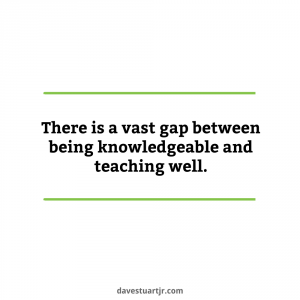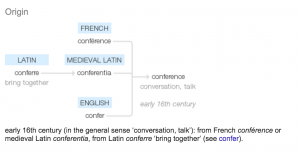When this post publishes, I'll be neck-deep in information at the annual NCTE conference. Actually, sitting here writing this and picturing what it was like at NCTE last year, let me correct that: I'll be drowning, happily.
But conferences are only an acute example of a situation that I suspect you, as a blog reader, are just as familiar with as I am: information overload.
Every day at school, we are inundated with dozens of emails, hundreds of conversations, and any professional reading we decide to do on top of that. If you're a person who enjoys informational reading or viewing in the evenings (or just surfing the Internet or social media), this info-intake continues well into the night, ending in some cases just prior to going to bed.
One reason that this might be insane is because information doesn't equal wisdom. Since I'm presently at the NCTE conference, allow me to cite T. S. Eliot as proof; according to him, information is twice removed from wisdom:
Endless invention, endless experiment,
Brings knowledge of motion, but not of stillness;
Knowledge of speech, but not of silence;
Knowledge of words, and ignorance of the Word.
All our knowledge brings us nearer to death,
But nearness to death no nearer to God.
Where is the Life we have lost in living?
Where is the wisdom we have lost in knowledge?
Where is the knowledge we have lost in information?
— from T. S. Eliot's Choruses in The Rock
 Regular readers know I enjoy reading research on teaching and psychology and school improvement (and, for the record, I think most research, and most of what we discuss at teacher conferences, probably falls into Eliot's “knowledge” category), but please don't be confused: reading forty times the amount I read (not that that would be so much) would not a great teacher make! There is a vast gap between being knowledgeable and teaching well. The former may enhance the latter, but the latter wholly animates the former; it transforms the dry bones of knowledge into a living, breathing thing. Teaching well, I think, lies in the ability to leverage our knowledge and experience toward making good instructional and relational decisions — and that's wisdom.
Regular readers know I enjoy reading research on teaching and psychology and school improvement (and, for the record, I think most research, and most of what we discuss at teacher conferences, probably falls into Eliot's “knowledge” category), but please don't be confused: reading forty times the amount I read (not that that would be so much) would not a great teacher make! There is a vast gap between being knowledgeable and teaching well. The former may enhance the latter, but the latter wholly animates the former; it transforms the dry bones of knowledge into a living, breathing thing. Teaching well, I think, lies in the ability to leverage our knowledge and experience toward making good instructional and relational decisions — and that's wisdom.
How to deal with information overload
So how do we make space for getting wiser in our information-flooded lives? Let's treat this in cases.
Professional Conferences

So say you're me right now, and you find yourself at a conference for teachers. (If you're at NCTE15, then definitely say hi.)
Conference Truth Number One: Just because you didn't go to every single conference session you could doesn't mean you didn't “get the most out of” the conference. The word conference itself comes from a Latin word for “bringing together” (see Figure 1). So, instead of simply consuming information ravenously, get together:
- With some great ideas at some sessions. Try to hit one given by someone you've heard about, one given by someone you've not, and one that's totally off your grid.
- With some other conference-goers. I am horrible at giving advice on this because I'm an introvert who is currently writing this in the safe confines of an empty classroom, and also because I've been writing and conference-going long enough to have a few meetings already set up before I get on the road and head to a conference. Here's my advice: when in doubt, go purchase a beverage in a lively spot and take in the scenery. Try to strike up a conversation. Or head to the exhibit hall, or a session, with the hope of meeting a peer you can chat with. Or lurk on Twitter and watch for meet-ups. There are options. Be brave.
- With yourself. I am good at this one. Take time to just get away and write — and no, you don't need to write about the latest line you just heard from The Gurus. Write about whatever you want: about what this conference has taught you about yourself, about teaching, about people, about information overload, etc.
Basically, that is all of the Conference Truths there are. Just one.
First, embrace the fact that not all of your emails need to be read, and not all of your email subscriptions ought to be kept (including your subscription to mine, if all it does is flood your inbox and make you feel pressure to read it!). People ought to use good subject lines when they email you, and a good subject line gives you a reasonable idea of what's going to be in the email. This allows you to decide if you will open or delete the email. Do more of that deleting part and less of that “open it for a few seconds, read it, then back out of it and mark it unread so you'll go back to it.” For a full treatment, see the Inbox Zero philosophy of email management.
Second, limit how much email reading you do. Check it once at lunch time, and once before going home. And then email me and tell me that you're better than me because I keep trying to do this and keep consistently failing. Time to delete email from my phone!
(Goes and deletes app. Boom!)
Meetings
Sometimes it's not possible, as a participant in a meeting, to keep things moving along (think: whole staff meeting), but in the case of smaller meetings, there is often wasted time that is within your control to minimize. For example, did you really need to share that anecdote from your classroom last week? Did that really advance the cause of the meeting?
Facebook and Twitter
Please keep in mind that all social media companies have at least one department that's job is addiction (though its label may be more euphemistically titled; something like Engagement, probably). The key here is limiting your time because this stuff is like email but with a lower percentage of usefulness. I know there are those of you out there who use Twitter or SnapFace for professional development domination, but for the rest of us, these things flood our minds with tiny bits of information and, in my estimation, cripple our ability to think.
All of these are obviously just my opinion, and you're free to disagree with any and all of them. But I'm curious to hear: what do you do to minimize information overload? [hr]
Thank you to Mr. Money Mustache, whose post helped inspire this one.
Debra Ehara says
Hi Dave, I hope you’re enjoying the NCTE conference. You motivated me into looking into going to the next one. Your blog on dealing with information overload was a good reminder. I work hard not to waste time on useless emails. Recently, I accidentally sent my entire personal email box to the trash, and all my emails disappeared. I decided (maybe regretfully) not to try to get them back, and guess what? I don’t miss them at all. I don’t feel like there was any email that I lost that’s going to destroy my life. I feel a little lighter. Although, I am already up to 932 emails) I realized thatI am holding on to a lot of information that I don’t need, and it weighs me down from gaining new and better information. Right now I am seeking out new information on my next steps. I am feeling a need for change, and I don’t know what it is, yet. I am putting my thoughts into words, so that hopefully, the right information will come back to me. Thanks for sharing your thoughts. Deb
davestuartjr says
Debra, I do hope you can attend NCTE next year in Atlanta! Your email annihilation event sounds a bit serendipitous to me — it is amazing how we become psychologically dependent on the things we hoard!
Bill says
Thank you, Dave, for your choice of the words enhance and animates. That is a close approximation of what my work with teachers attempts to convey and you have provided a wonderful description that I think teachers will see immediately. Thank you.
Bill
davestuartjr says
Bill, I appreciate that feedback — best to you and yours 🙂
Brenda Howell says
I just bought Mechanics Instruction that Sticks. It looks fantastic! I think this is just what I need for my classes.
Brenda
Cara says
Dave, I value your blog posts because they are easy to read, easy to digest, and easy to implement–perfect for those of us who struggle with information overload. Thanks!
Cara
Carin Misseldine says
I am usually a bit OCD about stuff, but somehow the sheer volume of the information assaulting me every day cured me, at least electronically, at trying to get it all. Your blog is a read-most-of-the-time, although sometimes several days later. Thank you for sharing your experiences, expertise, thoughts and research about teaching. I teach English, but I am a schedule-gap filler. I am a Spanish teacher (3 levels and AP) and this year teach one class of tenth-grade English and one class of Creative Writing. Some years I am mostly an English teacher, other years only one or two classes. I can deal with not reading every email (unread count is currently 5,016) and I can go to conferences and grab what I can and want to use now. My main problem is that I want to be able to teach each class with the confidence that I am teaching them with absolute excellence. I know I am a very good teacher; my heart is completely engaged as well as my knowledge. And I strive to give my best every day, but my best is not good enough. I have so many unmotivated students that are just floating along. Interims were Friday, and a third of my English students don’t currently have a passing grade. By the end of the quarter in December, all but two or three will reluctantly drag their grades into passing territory. Every year I am able to touch several students’ lives for the better, but most just seem to pass on through. After 15 years of teaching, I thought I would be able to do more to help my students become not only better in the subject I was teaching them but also as future adults. Pity party over, time to get going again. Thanks again for sharing your wisdom through this blog.